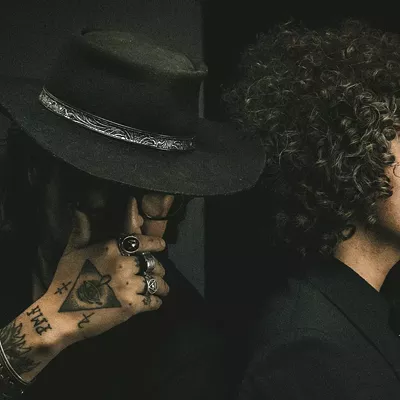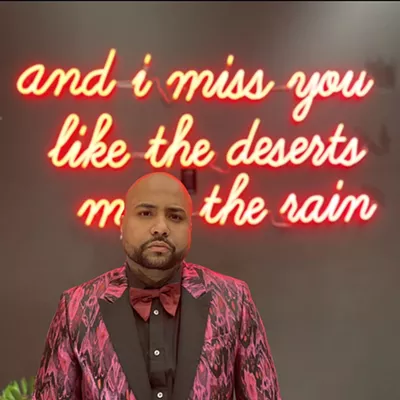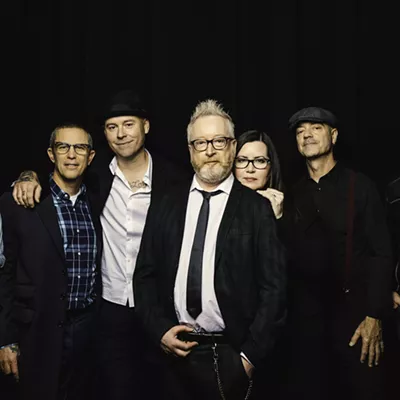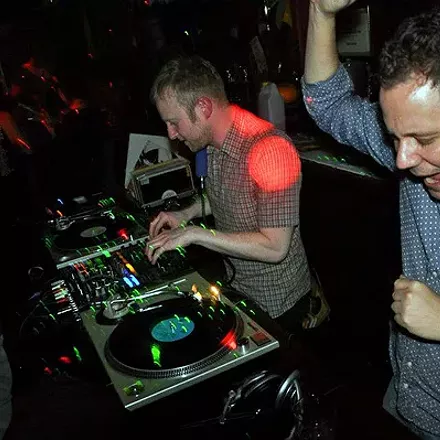If you'll turn to your Bible for a moment, you may notice that
he Bad Testament is nowhere to be found.
Yes, there's the Old Testament, followed as it tends to be, by the New Testament. But, according to the mindset of one Scott H. Biram, there's a big chunk missing in between those historical tomes. To be sure, there is an admirable measure of death, violence and hallucinatory visions spread across the existing books of scripture, but there are no verses that put across life's rougher lessons quite the way Biram does, for example: "It takes a real piece of shit to be a real piece of shit."
Amen.
"It's just south of the New Testament and just west of the AA Handbook," jokes Biram, discussing the source waters of his Bad Testament album and its trademark wisdom, rendered in a bluntly poetic style built of dark, dusty and blood-soaked verses like the aforementioned (from "Swift Driftin'") and "It's gonna be a long old time / before I pay for the crime that I done" (from "Long Old Time").
Biram, a 43-year-old Texan who speaks like he writes, is a one-man-band who doesn't see any contradictions in building a sound that's equal parts heavy metal, blues, bluegrass, country, folk, punk, gospel, psychobilly, roadhouse honky tonk and probably some unrecognizable influences as well.
"I wasn't always a solo artist or a one-man band. I was in bluegrass bands and punk bands all through high school and college," he says. "When my bands broke up, I wanted to keep playing rock clubs so I decided to be a one-man band. Eventually it became what it is today. I have so many different influences from different genres that it's really turned into something unique. There's noting that someone can do for you that you can't do better yourself. I try to stick to that idea."
Bad Testament is Biram's sixth album in the last dozen years for the Chicago-based alt-country Bloodshot Records. And like the other albums that have steadily built Biram a loyal fanbase around the country, Bad Testament touches on coffee shop folk, unhinged CBGB punk, the boom and snarl of Motörhead, the twang of Merle Haggard, and plenty else. Combat blues, he calls it, played on a '59 hollow-body Gibson and a stomp board.
"I'm always messing around on the guitar and trying to be innovative and learn new things here and there. As far as the music goes, that's what drives it," Biram says. "I have several different genres of music and I just slap them on there and see what happens. A lot of my records end up being more of a collage. I like to let things fall into place by themselves a little more naturally sometimes."
As far as the recording and production on Bad Testament, Biram was pushing for the sound that became his calling card.
"I was trying to do a throwback to my Dirty Old One Man Band record where it was pretty gritty," he says. "I was thinking of going back to that sound and not be too clean."
Now back to those lyrics. It's not like Biram starts an album trying to say any one thing. "I like to use records as actual record so my progress as a musician, to document some of the songs that I was writing at the time so they're not lost," he says. But as Bad Testament showcases particularly well, Biram pulls his verses far more often from the darker side of life than the lighter side.
"That's part of the old rocker in me, the darkness. It's like my old metal way of thinking that makes me lean that way," he says. "It's just more meaningful to me. I've struggled with depression my whole life, so it's something that I understand. I feel like darker songs are a little more captivating sometimes. I'm just not one of those 'La la la la la, it's a good day' types."
"That's part of the old rocker in me, the darkness. It's like my old metal way of thinking that makes me lean that way," he says. "It's just more meaningful to me. I've struggled with depression my whole life, so it's something that I understand. I feel like darker songs are a little more captivating sometimes. I'm just not one of those 'La la la la la, it's a good day' types."
Sometimes he'll sit down and try to write a song, but more often than not, the keepers are the ones that start rattling around in his head, unbidden at inopportune times, keeping him awake, fixated on some trouble or other.
"I saw the flame burning deep into the night," he sings on "TrainWrecker," a raw, devil-at-the-crossroads punk-blues bastard child of a song that's one of Bad Testiment's most vital, unrestrained moments.
"I consider myself a fairly spiritual person, but I don't put a lot of boundaries on that or I don't try to define it too much. I've also always had a little bit of a problem with organized religion. I feel like it's just a way to control people sometimes and it puts a bit of a bad taste in my mouth," he says. "I write a lot of gospel songs that are more about the feeling of the song than the subject matter for me. Then there are the ones where I'm giving a jab at organized religion and maybe being a little offensive even."
Biram doesn't hesitate to incorporate biblical imagery alongside those age-old themes of light and dark, but part of his secret is to leave enough out of his songs to let listeners make their own connections, finding what lies in between the lines.
"I don't necessarily write narrative songs as much as I write loose imagery songs, with a little bit of narrative, but I try to leave them open for people to make their own stories with them," he says. "I like people wondering what the hell I'm talking about. I don't even know what I'm talking about sometimes."
Whether he's lost and out of control or putting the fine touches on a pristine ballad, Biram finds his own way of saying things, like a preacher in a sermon, always reaching out for some greater truth.
"I always kind of walk the line on the records, that line of the human condition," he says. "It's always a push and pull of the dark and the light. That's how I always look at it."













